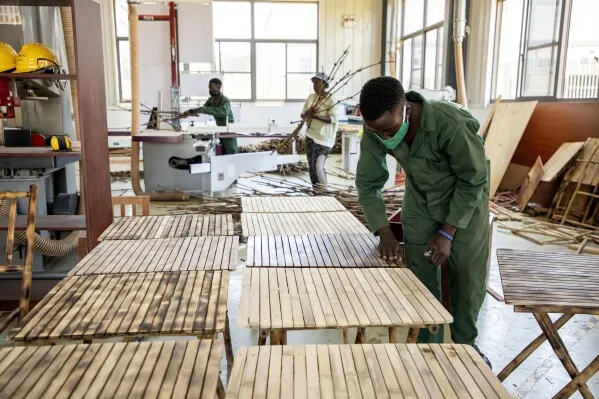Bamboo farming is on the rise in Uganda, where the hardy and fast-growing crop is seen by the government as having real growth potential.
Local authorities say it can be burned for fuel in rural communities, taking pressure off dwindling forest reserves of eucalyptus and other natural resources.
Conservationists say it’s a hardy plant that can grow almost anywhere. And businesses see it as a cash crop with uses that range from furniture to toothpicks.
Taga Nuwagaba, a bamboo farmer and businessman, owns a bamboo furniture factory near the Ugandan capital of Kampala.
It is an incredibly versatile material he says :“We are making a few products, not as many as we should. We are making these tables as you have seen, the chairs, we are making pens from the tip of the bamboo that we don’t normally use, we have definitely made cups, we have made trophies, we have made sculptures, we have made quite a number of things – quite a number of products. ”
Some of the bamboo species grown in Uganda are imported from Asia, but many – like one whose shoots are smoked and then boiled to make a popular traditional meal in eastern Uganda – grow wild.
A few kilometers out of Mbarara City in Western Uganda, there is a large commercial farm that includes a seven-acre bamboo lot.
The plants at Kitara Farm are well looked-after, and a stockpile of 10,000 bamboo poles sat waiting to be sold.
Caretaker Joseph Katumba said the property has become something of a demonstration farm for people who want to learn more about bamboo.
Bamboo plants are normally ready for harvesting in three to five years, and a well-maintained plantation can be useful for at least 50 years says Katumba.
“After our research on bamboo, we discovered that when you plant bamboo at the age of 12 – because you start harvesting bamboo after 3 years and start earning from it, so when you start harvesting after that 3rd year, your kids, your grandkids and your great grandkids will earn from that same bamboo – that is the reason why we stopped planting eucalyptus and resorted to bamboo.”
Unlike eucalyptus — a tall flowering plant widely planted here for its timber — there is no bamboo season.
Bamboo grows faster than eucalyptus and regenerates like a weed. It also can thrive in poor soil.
Kitara Farm stopped planting new eucalyptus lots while its bamboo acreage continues to expand.
But Nuwagaba says that the market needs to expand, so more people will be convinced of the benefits of growing bamboo.
“I have a few neighbors who have tried to grow bamboo but up until now people are still struggling with the use people are still struggling with its viability in the market, who buys it, what does it do and people haven’t seen many bamboo products – for example these tables and chairs you see here, it is very difficult to explain to someone what that forest does – if you told them that you get furniture out of it or sculptures as I have put it, people will not even believe, people still need to be sensitized (educated) about bamboo.”
A single bamboo pole brings a little less than a dollar, so farmers need to grow a lot of it to earn enough.
Bamboo promoters are urging them to see a bamboo plantation as the same kind of cash crop as coffee or tea estates.
Banks are offering bamboo “plantation capital” to clients, loans that promise ownership of substantial acres of bamboo.
Bamboo seedlings are now more widely available via private nursery beds.
Steve Tusiime, a self-described bamboo collector, owns one such nursery in Mbarara.
Tusiime says he’s been fascinated by the plant since seeing one as a boy.
“If you come here what you will see mainly bamboo but not only bamboo but several species of bamboo and each bamboo you see here has a story it has where it comes from and it has different use it has different names for example in that corner you see a giant bamboo, that giant bamboo is very specific to Asia and then in this corner you are also seeing another bamboo very specific to India. This one came from India and that one came from China. They are all bamboo, this one is also from China, but they have different uses, they have different characters so when you come here you look at bamboo, the story is bamboo.”
Still, Uganda’s bamboo plantations aren’t growing fast enough to build an industry around the plant.
Tusiime’s nursery has sold fewer than 10,000 seedlings in the past two years, confounding his own assessment of bamboo as an important cash crop which also happens to benefit the environment.
However Nuwagaba Taga says he can’t keep up with demand.
“The reason we export one container a month is because we don’t have sufficient raw materials so we exhaust whatever we have and then we export, but the company we are supplying requires six containers we can only do one for now – so we need people to grow bamboo so that we can now create; number one – (the) market that we are talking about, we can create demand, but we can also create enough raw materials so that we can actually now deliver something that is invoiceable.”
The Ugandan government has set a 10-year policy that calls for planting 300,000 hectares (about 1,100 square miles) of bamboo, most of it on private land, by 2029 as part of wider reforestation efforts.
That’s an ambitious target. The Uganda Bamboo Association, the largest such group with 340 members, has planted only 500 hectares.
Even with growing interest in bamboo farming, authorities will have to encourage more farmers in rural parts of Uganda to plant vast tracts of land with bamboo.



